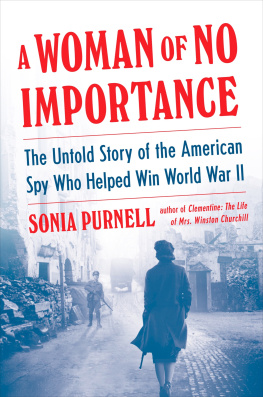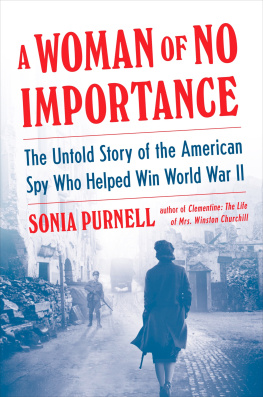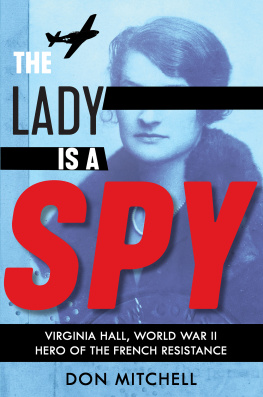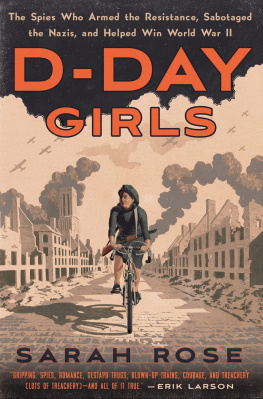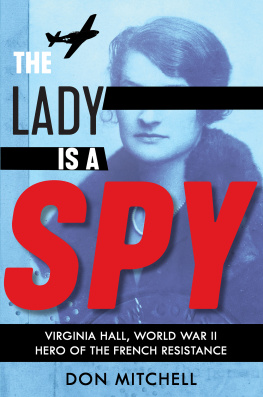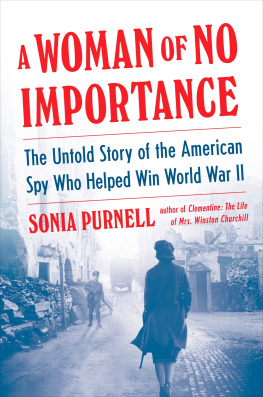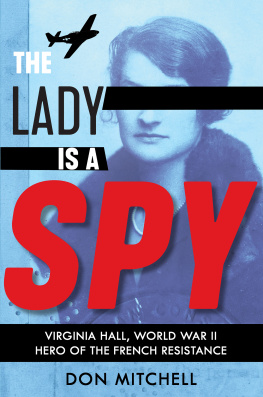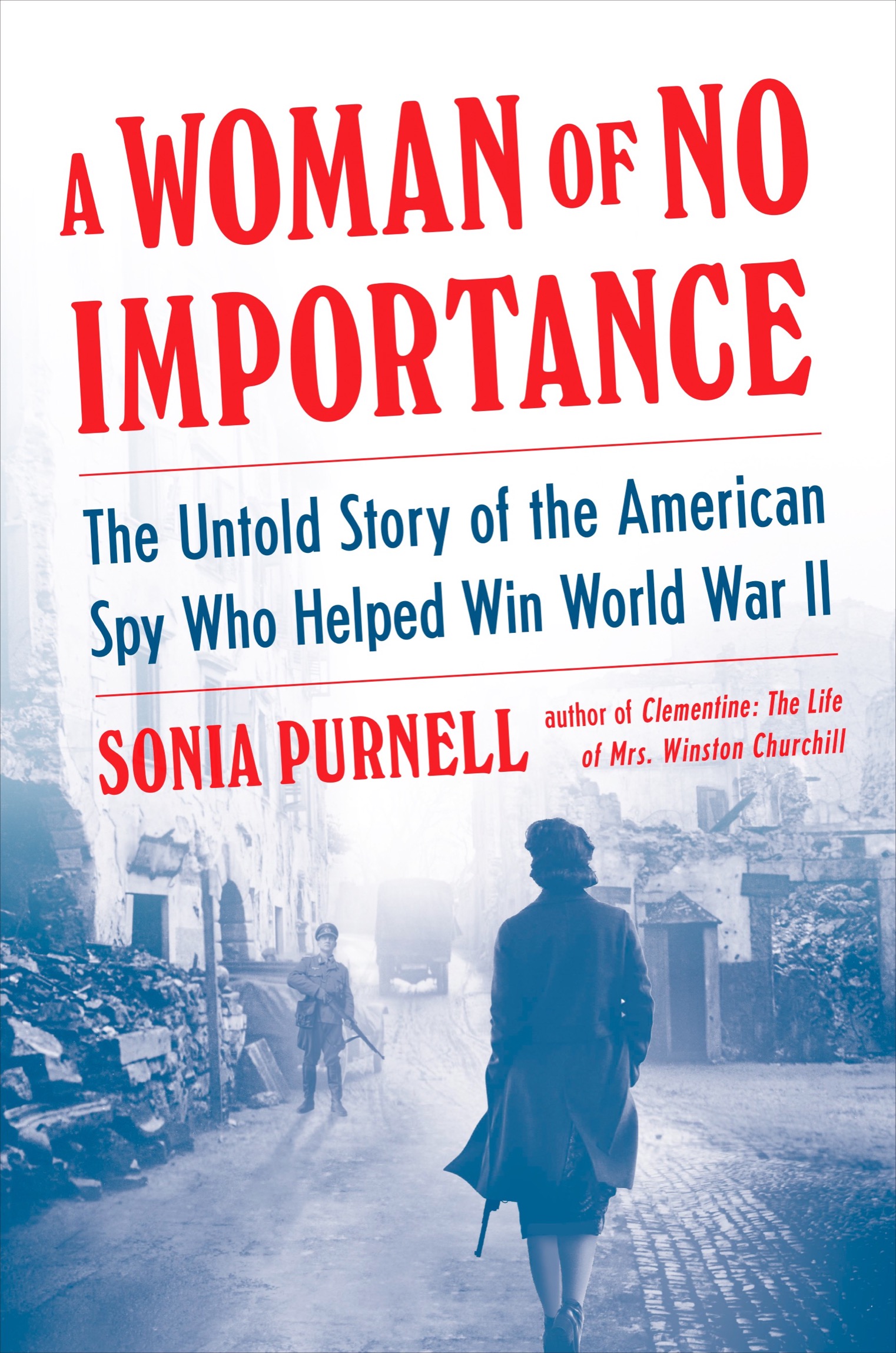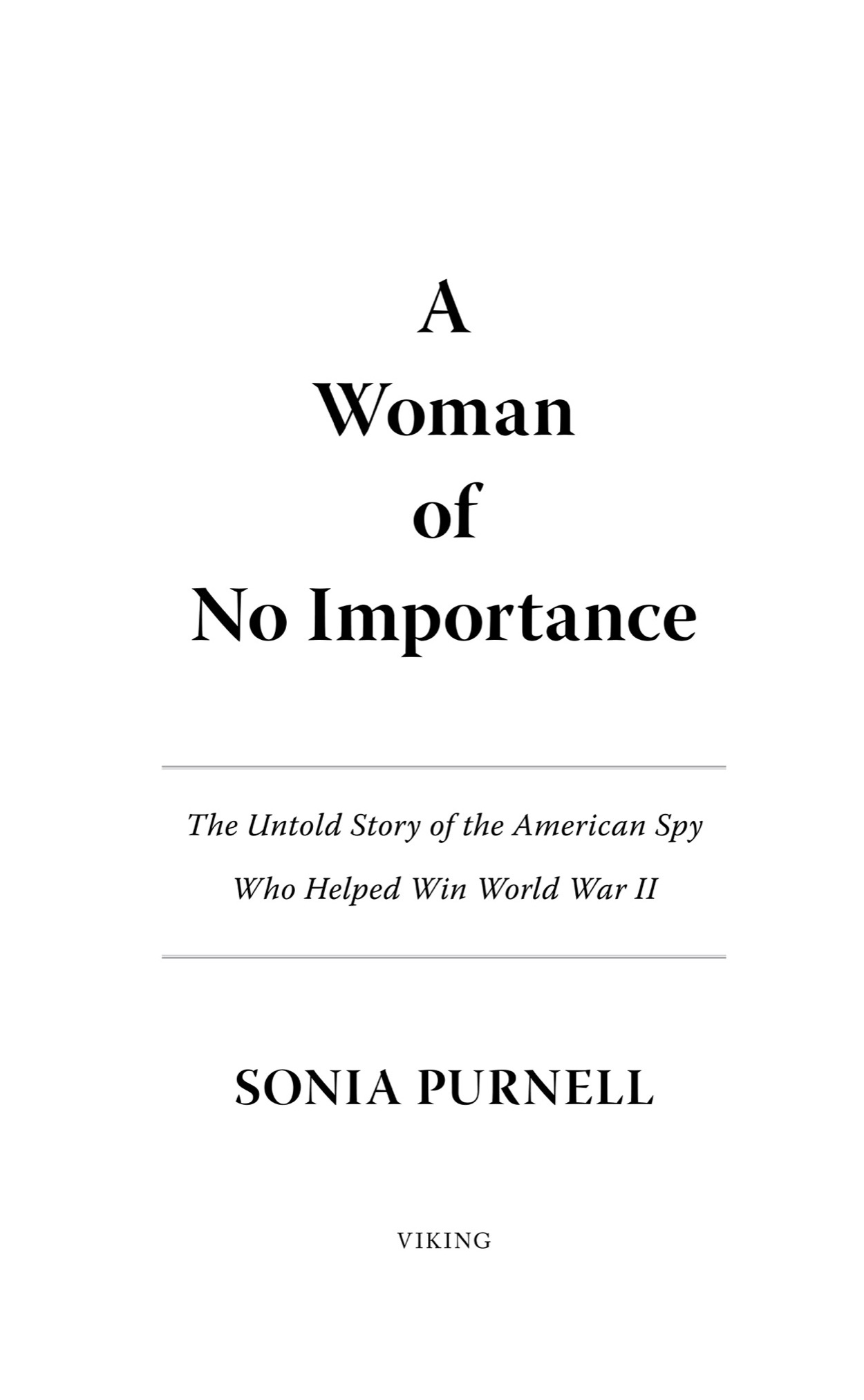VIKING
An imprint of Penguin Random House LLC
penguinrandomhouse.com
Copyright 2019 by Sonia Purnell
Penguin supports copyright. Copyright fuels creativity, encourages diverse voices, promotes free speech, and creates a vibrant culture. Thank you for buying an authorized edition of this book and for complying with copyright laws by not reproducing, scanning, or distributing any part of it in any form without permission. You are supporting writers and allowing Penguin to continue to publish books for every reader.
Insert credits: : Copyright Collection prive. Courtesy of Lieu de Mmoire au Chambon-sur-Lignon.
Map illustration by Barking Dog Art.
LIBRARY OF C ONGRESS CATALOGING - I N-PUBLICATION DATA
Names: Purnell, Sonia, author.
Title: A woman of no importance : the untold story of the American spy who helped win WWII / Sonia Purnell.
Description: [New York, New York] : Viking, [2019] | Includes bibliographical references and index. |
Identifiers: LCCN 2018060359 (print) | LCCN 2019000604 (ebook) | ISBN 9780735225305 (ebook) | ISBN 9780735225299 (hardcover) | ISBN 9781984877611 (international edition)
Subjects: LCSH: Goillot, Virginia, 1906-1982. | Women spies--United States--Biography. | Spies--United States--Biography. | Intelligence officers--United States--Biography. | World War, 1939-1945--Secret service--United States. | World War, 1939-1945--Underground movements--France.
Classification: LCC D810.S8 (ebook) | LCC D810.S8 G597 2019 (print) | DDC 940.54/8641092 [B] --dc23
LC record available at https://lccn.loc.gov/2018060359
Version_3
For Sue
19512017
Courage comes in many forms
The Resistance was a way of life.... We see ourselves there utterly free... an unknown and unknowable version of ourselves, the kind of people no one can ever find again, who existed only in relation to unique and terrible conditions... to ghosts, or to the dead.... [Yet] I would call that moment of my life Happiness.
Jean Cassou, Toulouse Resistance leader and poet
The ideal subject of totalitarian rule is not the convinced Nazi or the convinced Communist, but people for whom the distinction between fact and fiction (i.e., the reality of experience) and the distinction between true and false (i.e., the standards of thought) no longer exist.
Hannah Arendt, The Origins of Totalitarianism
It is from numberless diverse acts of courage and belief that human history is shaped. Each time a man stands up for an ideal, or acts to improve the lot of others, or strikes out against injustice, he sends forth a tiny ripple of hope, and crossing each other from a million different centers of energy and daring, those ripples build a current that can sweep down the mightiest walls.
Robert F. Kennedy
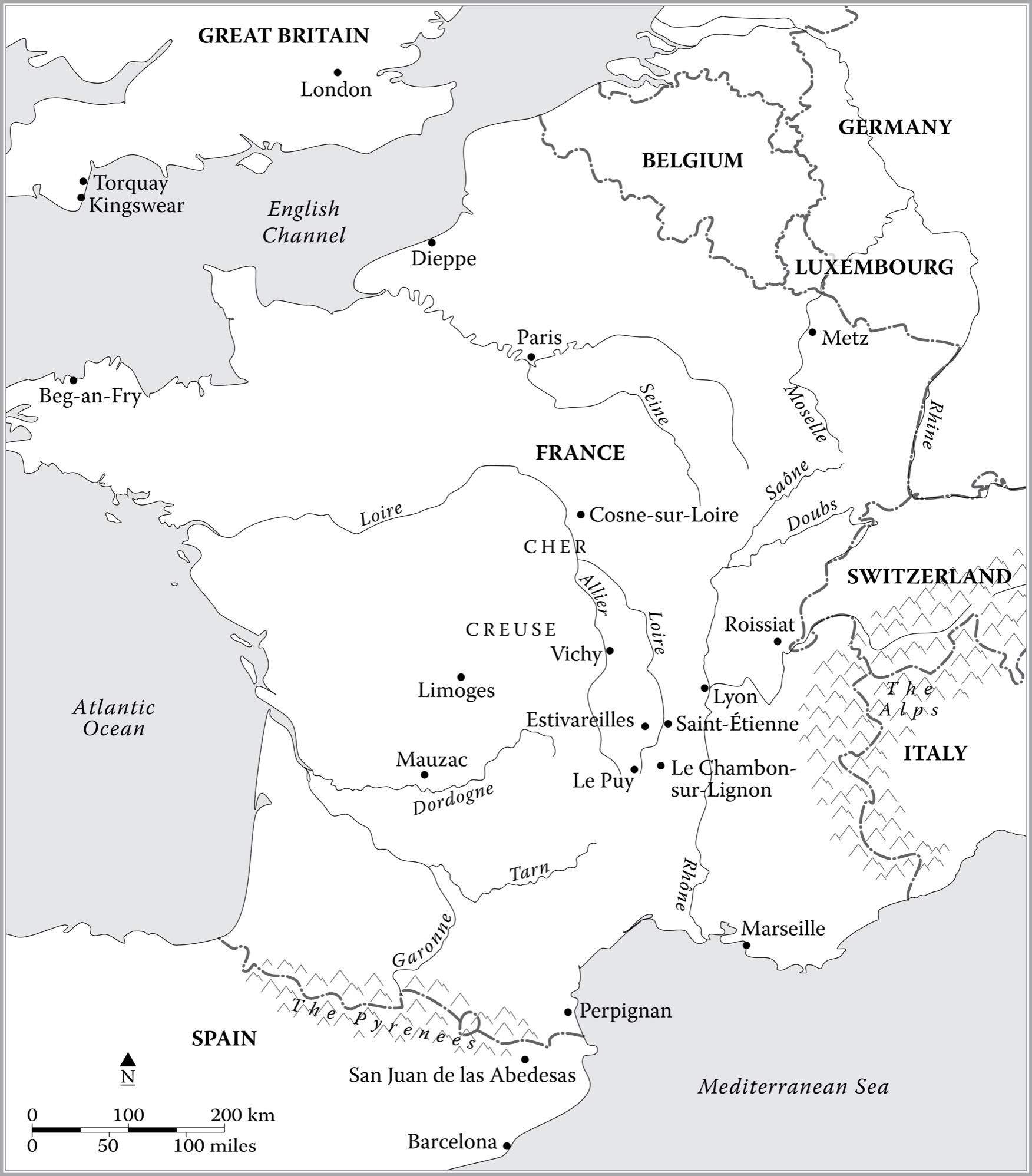
List of Characters
C ODE NAMES AND FIELD NAM ES APPEAR IN ITALICS THROUGHOUT THE BOOK . A GENTS OFTEN HAD MU LTIPLE CODE OR FIELD NAMES BUT FOR THE S AKE OF CLARITY I HAV E USED ONLY THE MOST RELEVANT .
Alain = Georges Duboudin
Antoine = Philippe de Vomcourt (also Gauthier, Major St. Paul)
Aramis = Peter Harratt (also Henri Lassot)
Artus & Auguste = Henry and Alfred Newton
Bishop = Abb Robert Alesch (also Ren Martin)
Bob = Raoul Le Boulicaut
Carte = Andr Girard
Clestin = Brian Stonehouse
Christophe = Gilbert Turck
Constantin = Jean de Vomcourt
Fontcroise = Captain Henri Charles Giese
Georges = Georges Bgu
Gvolde = Serge Kapalski
Gloria = Gabrielle Picabia
Lucas = Pierre de Vomcourt (also Sylvain)
Marie = Virginia Hall (also Germaine, Philomne, Nicolas, Diane, Diana, Marcelle, Brigitte, Isabelle, Camille, DFV, Artemis)
Nicolas = Robert Boiteux (also known as Robert Burdett)
Olive = Francis Basin
Ppin = Dr Jean Rousset
Ren = Victor Gerson (also Vic)
Sophie = Odette Wilen
Victoire = Mathilde Carr (or La Chatte)
Contents
Prologue
France was falling. Burned-out cars, once strapped high with treasured possessions, were nosed crazily into ditches. Their beloved cargoes of dolls, clocks, and mirrors lay smashed around them and along mile upon mile of unfriendly road. Their owners, young and old, sprawled across the hot dust, were groaning or already silent. Yet the hordes just kept streaming past them, a never-ending line of hunger and exhaustion too fearful to stop for days on end.
Ten million women, children, and old men were on the move, all fleeing Hitlers tanks pouring across the border from the east and the north. Entire cities had uprooted themselves in a futile bid to escape the Nazi blitzkrieg that threatened to engulf them. The fevered talk was of German soldiers stripped to the waist in jubilation at the ease of their conquest. The air was thick with smoke and the stench of the dead. The babies had no milk, and the aged fell where they stood. The horses drawing overladen old farm carts sagged and snarled in their sweat-drenched agony. The French heat wave of May 1940 was witness to this, the largest refugee exodus of all time.
Day after day a solitary moving vehicle weaved its way through the crowd with a striking young woman at the wheel. Private Virginia Hall often ran low on fuel and medicines but still pressed on in her French army ambulance toward the advancing enemy. She persevered even when the German Stukas came screaming down to drop 110-pound bombs onto the convoys all around her, torching the cars and cratering the roads. Even when fighter planes swept over the treetops to machine-gun the ditches where women and children were trying to take cover from the carnage. Even though French soldiers were deserting their units, abandoning their weapons, and running away, some in their tanks. Even when her left hip was shot with pain from continually pressing down on the clutch with her prosthetic foot.
Now, at the age of thirty-four, her mission marked a turning point after years of cruel rejection. For her own sake as much as for the casualties she was picking up from the battlefields and ferrying to the hospital, she could not fail again. There were many reasons why she was willingly jeopardizing her life far from home in aid of a foreign country, when millions of others were giving up. Perhaps foremost among them was that it had been so long since she had felt so thrillingly alive. Disgusted at the cowardice of the deserters, she could not understand why they would not continue the fight. But then she had so little to lose. The French still remembered sacrificing a third of their young menfolk to the Great War, and a nation of widows and orphans was in no mood for more bloodshed. Virginia, though, intended to go on to the end, wherever the battle took her. She was prepared to take whatever risks, face down any dangers. Total war against the Third Reich might perversely offer her one last hope of personal peace.
Yet even this was as nothing compared with what was to come in a life that drew out into a Homeric tale of adventure, action, and seemingly unfathomable courage. Virginia Halls service in the France of summer 1940 was merely an apprenticeship for a near suicide mission against the tyranny of the Nazis and their puppets in France. She helped to pioneer a daredevil role of espionage, sabotage, and subversion behind enemy lines in an era when women barely featured in the prism of heroism, when their part in combat was confined to the supportive and palliative. When they were just expected to look nice and act obedient and let the men do the heavy lifting. When disabled womenor menwere confined to staying at home and leading often narrow, unsatisfying lives. The fact that a young woman who had lost her leg in tragic circumstances broke through the tightest constrictions and overcame prejudice and even hostility to help the Allies win the Second World War is astonishing. That a female guerrilla leader of her stature remains so little known to this day is incredible.

